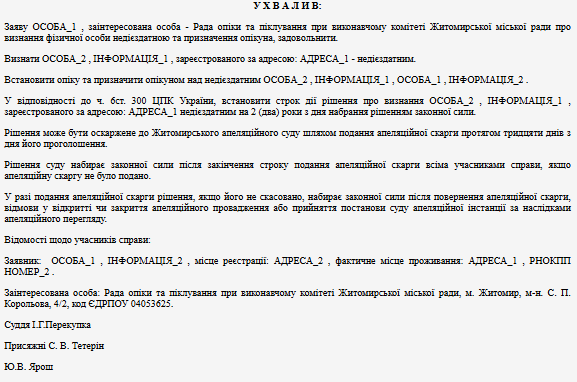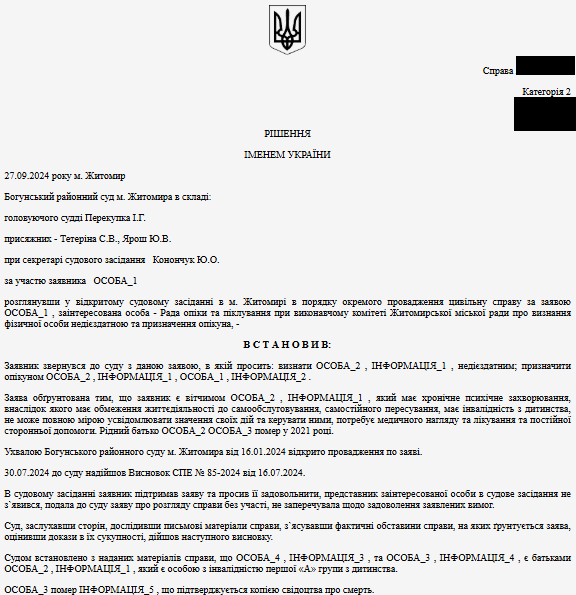My name is Lika Shvetsova, I am a lawyer from Katowice, Poland. Key areas of law are civil, commercial, administrative and private international law. I provide the option of conducting cases in English and Arabic, e-commerce support.
Situation description: The applicant filed a petition with the court requesting to declare the person incapacitated and appoint a guardian for this individual. According to the submitted petition, the applicant is the stepfather of the person who suffers from a chronic mental illness. This illness leads to serious limitations in their ability to perform basic life functions, such as self-care and independent mobility. As a result of these impairments, the person requires constant assistance, medical supervision, treatment, and care.
In this case, the applicant notes that the relative, specifically the person’s father, passed away in 2021, which significantly complicated the situation. Since the person is unable to perform basic functions such as caring for their health, managing their finances, or providing care for themselves, there arose an urgent need to formalize the legal status of guardianship.
Grounds for the petition:
The petition was substantiated by the following facts:
- Chronic mental illness: The person has a chronic mental illness that significantly limits their ability to self-care. They cannot perform daily tasks without assistance.
- Disability from childhood: Since the person has had a disability since childhood, they are not fully responsible for their life. They cannot fully comprehend the meaning of their actions and, therefore, cannot undertake transactions requiring full mental capacity.
- Constant medical supervision and assistance: The health problems of this person require regular medical care, treatment, and supervision. Without proper care and support, their condition could worsen, leading to further complications.
- Father’s death: Since the biological father passed away in 2021, it was no longer possible to receive the necessary assistance and support from him. This created a situation where the lack of family oversight made it necessary to appoint a guardian to ensure the proper care.
Task for the lawyer:
- Recognition of incapacity: It was necessary to assess the mental state of the individual and gather the required medical documents confirming their incapacity. This included consultations with doctors, obtaining conclusions from psychiatrists, and documents confirming the limited ability of the individual to carry out independent activities.
- Appointment of a guardian: Since the person is incapable of independent existence, it was necessary to ensure their care and support by appointing a guardian. In this situation, the applicant, as the stepfather, was the only person who could take on the responsibilities of a guardian.
- The process of declaring incapacity and appointing a guardian:
- Collection of medical documents:
- Consultations with doctors and psychiatrists:
- Preparation of the claim:
- Filing the petition with the court:
Court decision:
The court granted the petition, declared the individual incapacitated, and appointed the applicant as the guardian. The court concluded that in this case, all grounds for declaring the person incapacitated were sufficient. The court also found that appointing the applicant as the guardian was in the best interests of the person, as he is the closest relative and has the necessary experience and ability to provide the required care and support.
Role of the guardian
The guardian bears legal responsibility for the well-being and welfare of the individual they are responsible for. This status grants the guardian the right to make decisions regarding medical care, finances, and other critical aspects of the incapacitated person's life. The guardian is also responsible for ensuring proper living conditions and care.
Involving a lawyer in this case was crucial to the successful outcome. The lawyer carefully assessed the situation, prepared a claim that met all the requirements, and collected the necessary evidence regarding the person’s mental state requiring guardianship. Additionally, the consultation with the client about the legal nuances of the process helped to minimize risks.
The lawyer represented the applicant’s interests in court, which contributed to the positive outcome of the case. Thanks to the lawyer’s professionalism, the court declared the person incapacitated and appointed the appropriate guardian, ensuring proper care and support. Legal assistance was a critical factor in achieving the desired result and ensuring stability in the life of the person needing help.






























